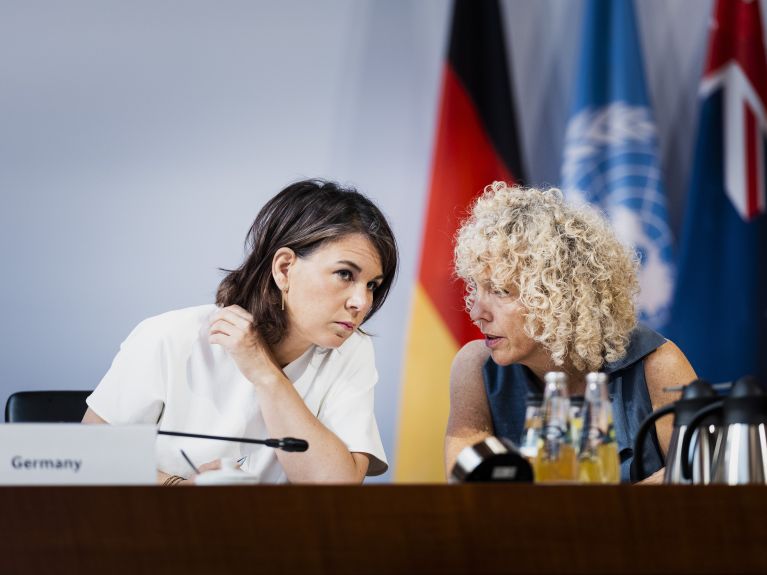Climate diplomacy sends signal
More ambition in solidarity is Germany’s goal at COP27 – Jennifer Morgan wants to send a signal.

Not to permit any backpedalling despite the adverse circumstances – that is one way to summarize the German government’s main objective at the upcoming COP27 climate summit in the Egyptian city of Sharm el-Sheikh. The global energy and food crisis must not lead to a renaissance of the fossil-based economy, stresses Jennifer Morgan, State Secretary and Special Envoy for International Climate Action at the Federal Foreign Office: “Otherwise we risk no longer being able to cope with the situation at all.”
Scientists can point to a whole host of recent analyses to highlight how dramatic the situation is. The World Energy Outlook from the International Energy Agency, the Emission Gap Report from the United Nations Environment Programme (UNEP) and the UN’s latest climate report all have one clear message, which Jennifer Morgan summarises as follows: “We are not on track.” If nothing more were to be done beyond those measures that have already been put in place, we would be heading for a world that would be 2.7 degrees warmer than in the pre-industrial era. Far above the 1.5 degree target agreed in Paris, in other words. “We must close this gap,” says Morgan. “Every tenth of a degree less means less loss and damage, less migration, fewer conflicts.”
We must send a clear signal of solidarity.
However, and that’s the good news from scientists – the worst can still be prevented. In this context, Germany’s federal government regards three fields of action as vital: firstly, accelerating the global transition to renewable energy sources. Then, promoting multilateral cooperation, in the form of energy partnerships for example. And, perhaps the most important new focus, the provision of funding to cover climate-related losses and damages. “We must send a clear signal of our solidarity with the most vulnerable states, which continue to bear the brunt in this area,” emphasised Morgan, who has big plans in this context for Sharm el-Sheikh. Together with the Chilean environment minister, she will chair the negotiations on compensation for future weather disasters.
For Germany, COP 27 is also supposed to be an opportunity to send a signal in climate diplomacy. The objective of viewing climate protection as a cross-sectional and inter-departmental task was formulated in the government’s coalition agreement. “Climate Team Germany” was launched under the auspices of the Federal Foreign Office and will represent Germany in Sharm el-Sheikh. While the country was represented at previous climate summits by the Federal Environment Ministry, the Federal Foreign Office, the Federal Economics Ministry and the Federal Development Ministry are now joining it as equal partners.
Inter-departmental “Climate Team Germany”
Dr Christiane Rohleder, State Secretary at the Federal Ministry for the Environment, Nature Conservation, Nuclear Safety and Consumer Protection (BMUV), sees the fact that climate action is now a top-level priority in several ministries as a great strength. She explains that in the view of the BMUV, the climate crisis is to be regarded as part of a threefold global challenge that comprises not only global warming but also the loss of biodiversity and the increasing pollution of ecosystems. “What we therefore need are solutions that ideally tackle several problems at once.” Measures to restore natural habitats can create synergies between climate protection and the preservation of habitats, she says.
The Federal Ministry for Economic Affairs and Climate Action (BMWK) sees its main job as being to put green transformation concepts into practice – especially against the backdrop of the current energy crisis. For example, new liquefied gas terminals that are currently being built could also handle green hydrogen and ammonia in future. In its turn, the Federal Ministry for Economic Cooperation and Development (BMZ) is focusing on achieving an energy transition in emerging and developing economics, which are responsible for two thirds of global greenhouse gas emissions. As Jürgen Zattler, director of international cooperation at the BMZ, stresses, the plan at COP27 is above all to promote the just transition concept. “The transition is not only a technical problem, it also involves major efforts on the part of society. We are therefore no longer concentrating only on individual projects, but looking carefully to determine: What challenges is the country facing? And how can we help it?”
All of this ties in with the motto that Team Germany has defined for itself at the climate summit: more ambition in solidarity. “We will deem COP 27 a success if we succeed not only in further accelerating the energy transition but if we are able to signal to the most vulnerable countries that we will not leave them alone, that we will stand by them,” says Jennifer Morgan.
The most important information about COP27 can be found here.


